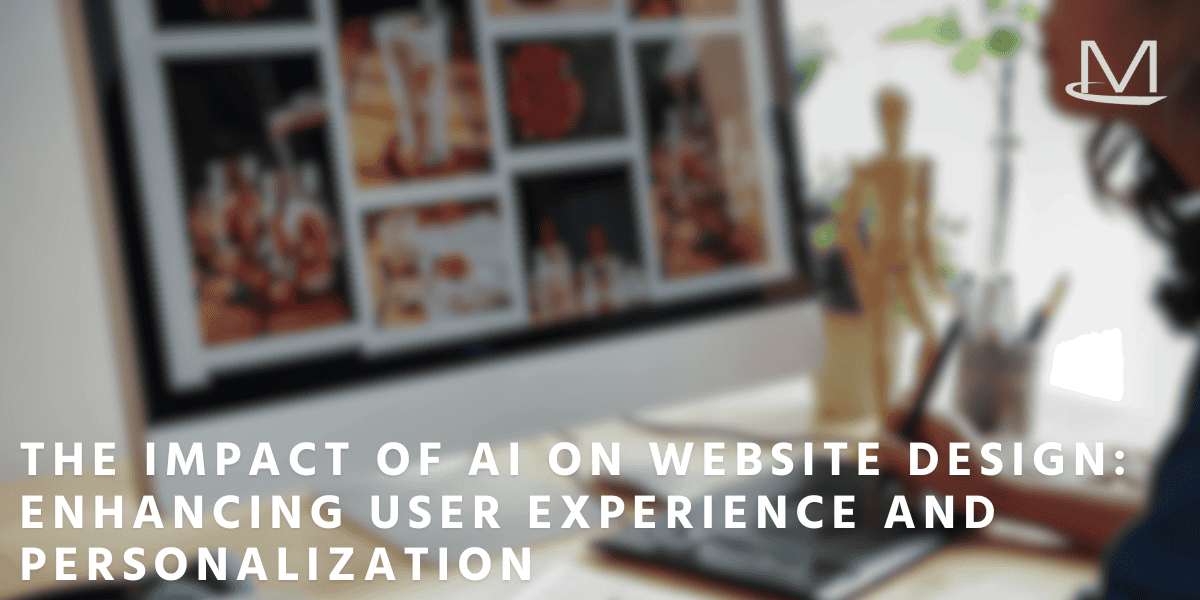
30 Apr The Impact of AI on Website Design: Enhancing User Experience and Personalization
How AI Can Enhance Your Website Design
Artificial Intelligence (AI) is revolutionizing website design, enhancing user experience (UX) and personalization. By leveraging AI technologies, businesses can create more intuitive, responsive, and personalized websites that cater to individual user needs. This transformation not only improves user satisfaction but also drives engagement and conversions.
In this month’s blog post, we’re diving into how AI is reshaping the future of website design and what that means for your business. From personalized content recommendations to adaptive interfaces that respond to real-time user behavior, AI is opening up new ways to connect with your audience online.
We’ll explore how these innovations are improving user experiences, increasing engagement, and making it easier for businesses to deliver the right message to the right person at the right time.
Understanding AI in Website Design
AI in website design refers to the integration of machine learning algorithms, data analysis tools, and automated systems that enable websites to adapt and respond to user behaviors in real-time. Unlike traditional static websites, AI-driven platforms can adjust content, layout, and functionality based on individual user interactions and preferences.
These technologies analyze vast amounts of data – including browsing history, click patterns, device type, and location – to identify trends and predict what users are likely to engage with next.
This capability allows businesses to deliver more relevant and engaging experiences without manual adjustments. For example, AI can suggest product recommendations, adjust website navigation based on frequently visited pages, or modify calls-to-action depending on where a user is in their customer journey.
As a result, the website becomes a smarter, more intuitive tool that not only meets the needs of users but also helps businesses achieve their marketing and sales goals. The integration of AI into website design isn’t just about automation – it’s about creating responsive, data-informed digital experiences that feel tailored to every visitor.

Benefits of Integrating AI in Website Design
Incorporating AI into website design offers practical advantages that improve both the user experience and overall business outcomes. Here’s a breakdown of the key benefits:
Increased Engagement
AI-powered personalization keeps visitors interested by delivering relevant content, product suggestions, and interactive features tailored to their preferences. This targeted approach reduces bounce rates, encourages deeper site exploration, and extends the time users spend engaging with your content.
Higher Conversion Rates
When users can easily find content or products that align with their needs, they’re more likely to take action. AI helps streamline the user journey, removing obstacles and offering timely, relevant suggestions — which ultimately leads to higher conversion rates, whether it’s signing up for a newsletter, making a purchase, or booking a service.
Enhanced User Satisfaction
A website that feels custom-built for each visitor naturally creates a better experience. AI allows sites to adapt in real-time, adjusting layouts, content, and recommendations based on user interactions. This responsiveness fosters trust and satisfaction, encouraging users to return and engage with your brand more frequently.
Challenges and Considerations of Using AI
While the benefits of AI in website design are substantial, it’s important to remain mindful of potential risks and challenges. Being proactive about these concerns helps businesses maintain user trust and ethical standards.
Data Privacy
AI relies on large amounts of user data to function effectively, which raises concerns about privacy and security. Businesses must implement strict data protection policies, clearly communicate data collection practices, and comply with regulations like GDPR or CCPA to safeguard sensitive user information.
Algorithm Bias
Since AI systems learn from historical data, they can unintentionally perpetuate existing biases present in that data. This can result in skewed content recommendations or user experiences that may be unfair or discriminatory. Regular auditing and diverse data inputs are necessary to minimize bias and maintain ethical AI use.
Over-Personalization
While personalization is valuable, too much of it can create a “filter bubble,” limiting the variety of content users see and reducing opportunities for discovery. Striking a balance ensures that while content remains relevant, users are still exposed to new and diverse information that broadens their experience.
Future Outlook

Ready to Elevate Your Website Experience?
AI is transforming website design by enabling more personalized, engaging, and intuitive user experiences. By incorporating AI technologies, businesses can build dynamic websites that adapt to individual visitor needs in real time – boosting satisfaction, engagement, and conversions.
At the same time, it’s important to thoughtfully address challenges like data privacy, algorithm bias, and over-personalization to ensure AI is used ethically and effectively.
At McWilliams Media, we stay ahead of the curve when it comes to digital trends and AI-driven solutions. Whether you’re looking to enhance your current website or build a new, AI-powered platform from the ground up, our team is here to help you create a smarter, more personalized online experience for your audience.









